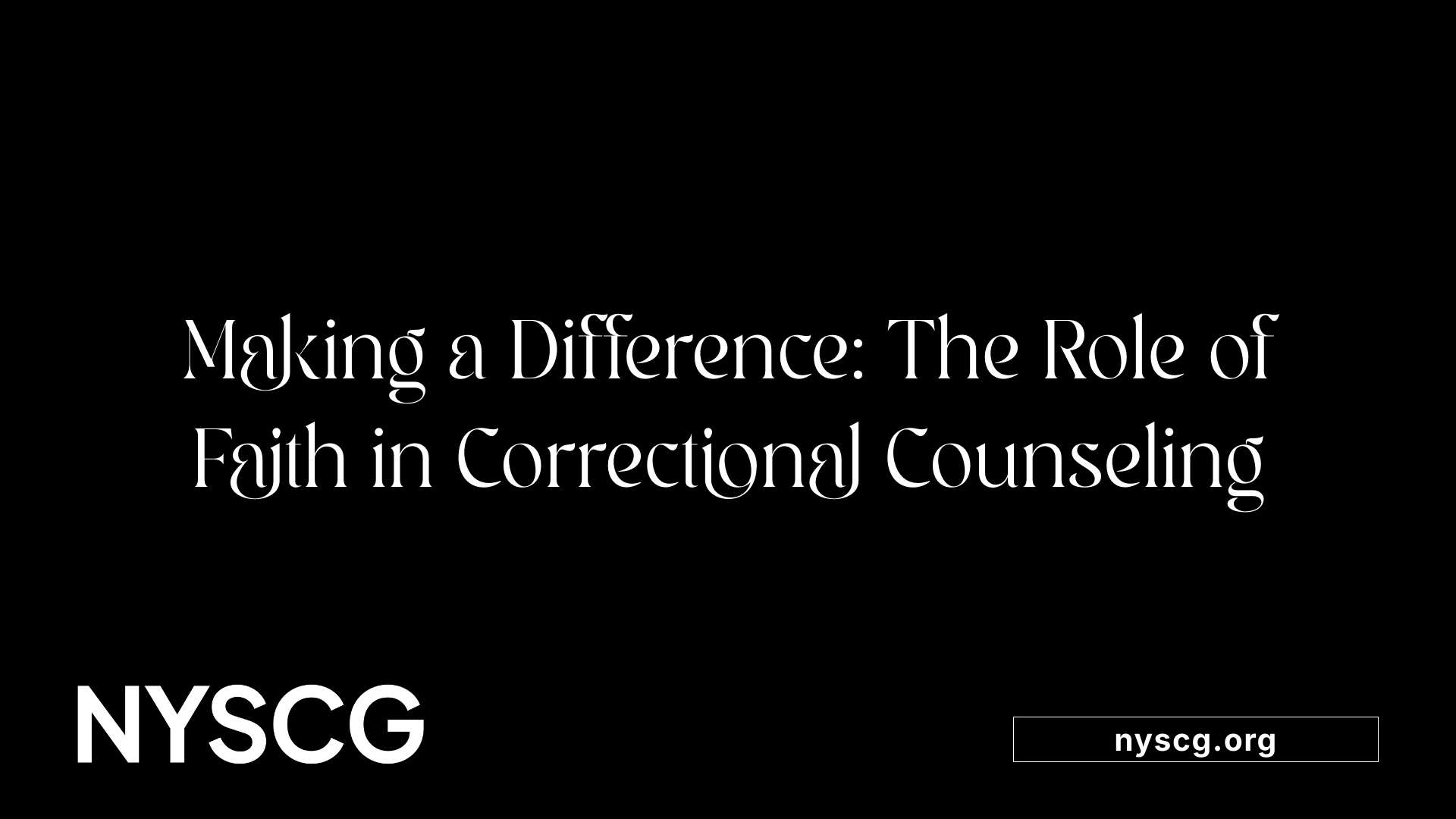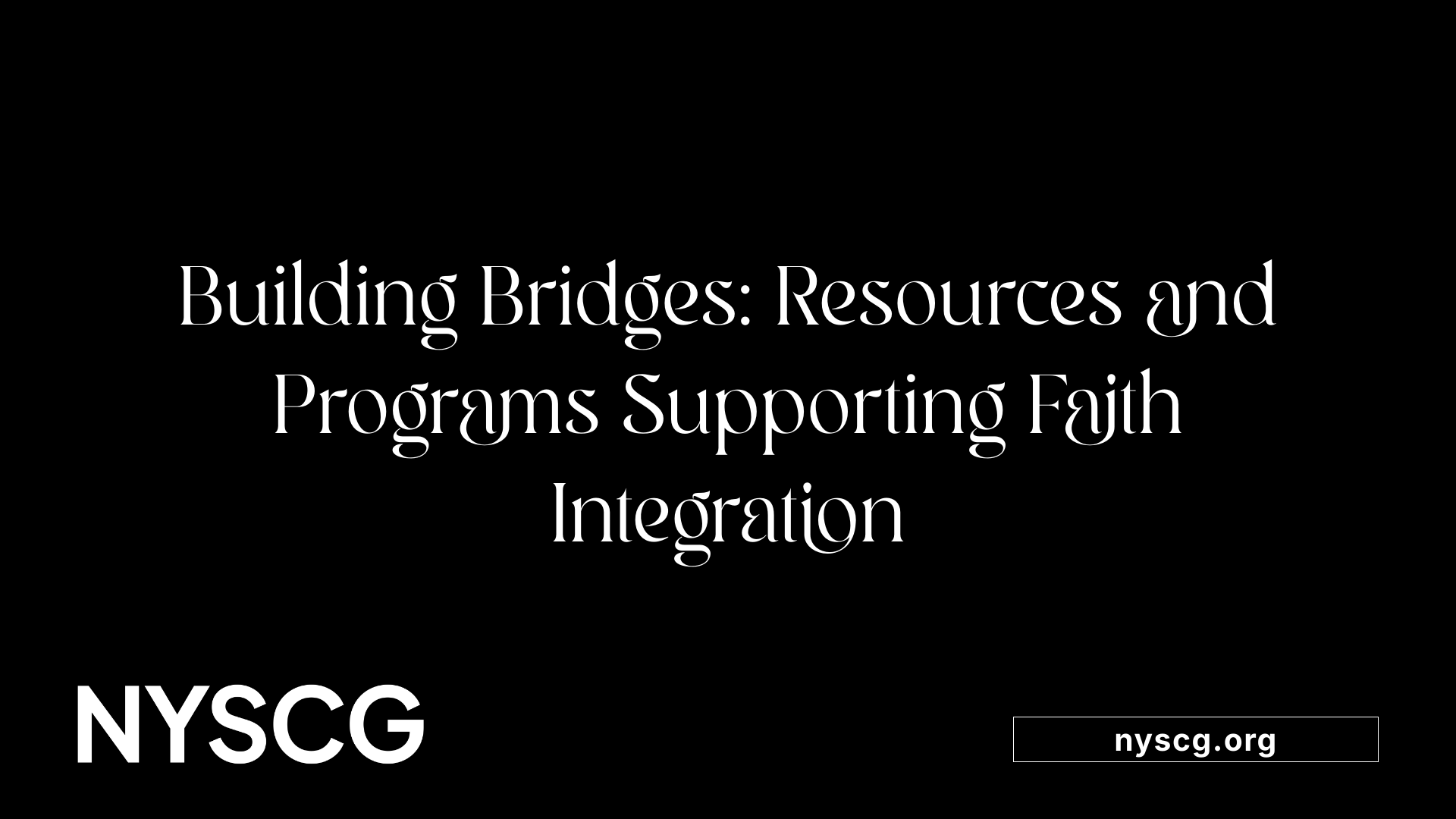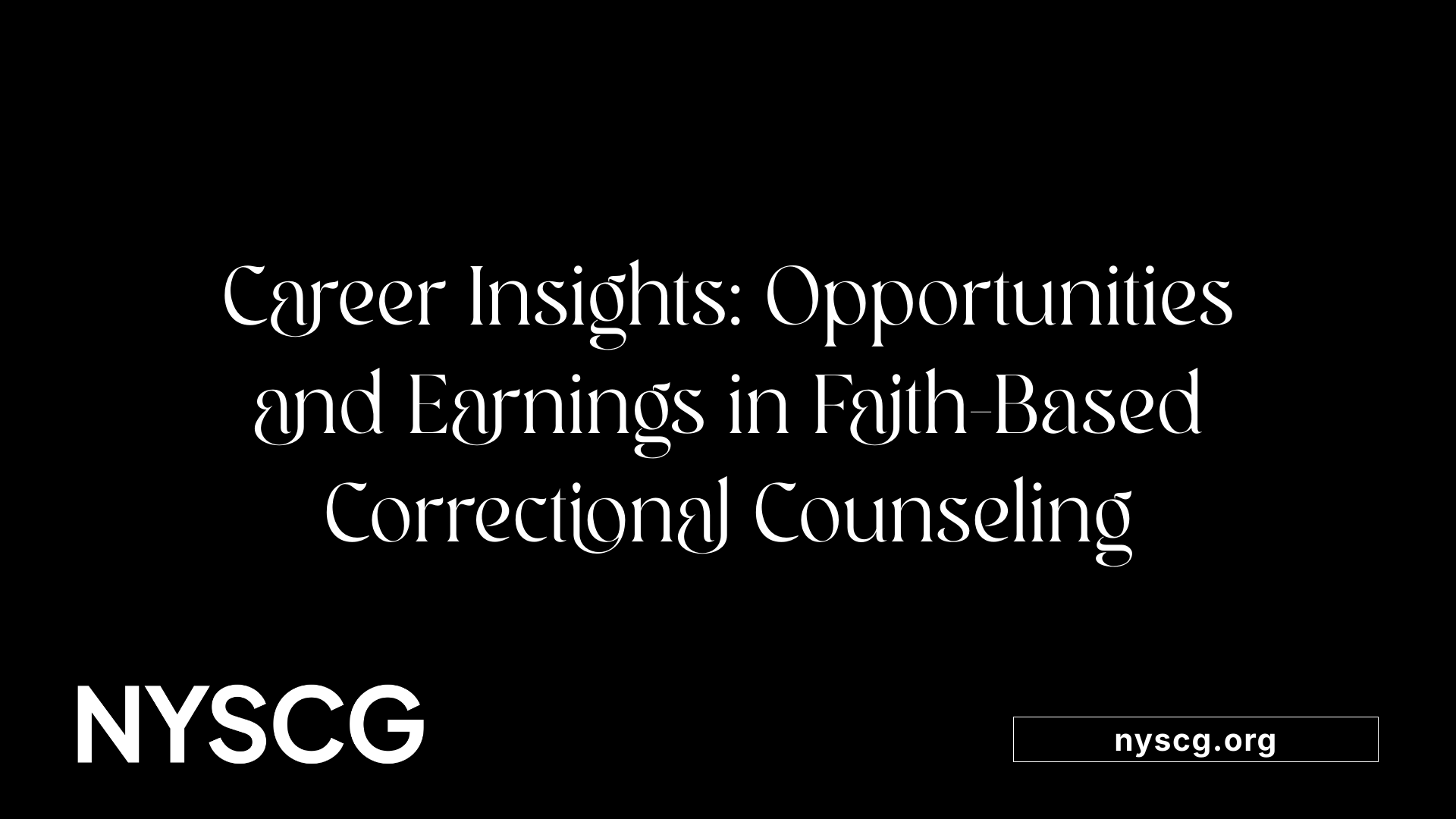Becoming a Correctional Counselor: Faith-Based Entry Points


Correctional counseling is a vital component of the criminal justice system, dedicated to rehabilitating offenders and facilitating their reintegration into society. With increasing recognition of the role that faith and spirituality play in behavioral change and moral development, faith-based correctional entry points are gaining prominence. This article explores the educational pathways, certification requirements, roles, and resources for aspiring correctional counselors who wish to incorporate faith into their practice, highlighting how spiritual support enhances rehabilitation outcomes.
 Becoming a correctional counselor involves meeting specific educational and certification standards designed to prepare professionals for the complexities of working within the criminal justice system. Most positions require at least a bachelor's degree in relevant fields such as criminal justice, psychology, social work, or sociology. This foundational education provides essential knowledge about human behavior, legal systems, and rehabilitation strategies.
Becoming a correctional counselor involves meeting specific educational and certification standards designed to prepare professionals for the complexities of working within the criminal justice system. Most positions require at least a bachelor's degree in relevant fields such as criminal justice, psychology, social work, or sociology. This foundational education provides essential knowledge about human behavior, legal systems, and rehabilitation strategies.
In addition to formal degrees, relevant work experience can also satisfy educational prerequisites. For example, candidates with at least one year of experience in correctional or social services roles—such as working with at-risk populations or providing community support—may be eligible, especially if coupled with graduate coursework relevant to correctional work.
Graduate education, including a master’s degree in counseling, clinical psychology, or a related area, is often necessary for advanced or specialized roles. Courses covering correctional systems, offender rehabilitation, and mental health are highly valuable.
Candidates must pass various examinations, including written tests that cover correctional procedures, inmate management, and behavioral assessment. Background checks, drug screenings, and medical and psychological evaluations are mandatory to ensure suitability for correctional work.
Certification is also a crucial component. Professionals are frequently required to obtain state or national certifications from recognized organizations. For example, the Commonwealth Law Enforcement Assistance Network (CLEAN) and the Pennsylvania Justice Network (JNET) certifications are commonly required shortly after hiring.
Achieving certification and maintaining licensure often involves completing ongoing professional development, participating in training workshops, and fulfilling supervised internship or field experience hours. These steps not only enhance skills but also ensure compliance with regulatory standards for correctional counselors.
In summary, a combination of relevant undergraduate or graduate education, practical experience, passing required exams, and obtaining professional certifications constitute the foundation for a career as a correctional counselor. Staying current with continuing education and certifications is essential for career advancement and effective practice in this evolving field.

Correctional counselors play a vital role in the rehabilitation process within the criminal justice system. Their primary responsibilities include assessing inmate needs, developing tailored treatment and rehabilitation plans, and conducting both individual and group counseling sessions. These efforts are aimed at fostering pro-social behavior, reducing recidivism, and supporting mental health.
In faith-based correctional programs, counselors often go beyond traditional methods by integrating spiritual guidance and faith resources into their approaches. This can involve facilitating religious study groups, encouraging spiritual reflection, and incorporating faith-inspired practices that aim to support inmates’ moral development and spiritual growth.
Furthermore, correctional counselors act as liaisons among various stakeholders. They coordinate with facility staff, community agencies, and parole services to ensure that treatment plans are continuous and that inmates receive comprehensive support for their reintegration after release.
Their work also encompasses classification tasks, crisis intervention, emergency response, and discharge planning. Many specialize in programs addressing substance abuse, anger management, domestic violence, and other specific issues, using methods that often include faith-informed strategies.
Ultimately, correctional counselors in faith contexts address the psychological, social, and spiritual needs of inmates. Their goal is to promote rehabilitation, foster moral and spiritual development, and prepare offenders for a successful, constructive reentry into society.

Embarking on a career in faith-based correctional counseling involves a combination of education, specialized training, and practical experience. The journey begins with obtaining a relevant degree—most often in psychology, social work, criminal justice, or a related field. Typically, pursuing at least a bachelor’s degree is the minimum requirement, but a master’s degree, such as an MS in Counseling or an MA in Clinical Psychology with focus on forensic or correctional psychology, can greatly improve career prospects.
Once the foundational education is in place, aspiring counselors should seek specialized training or certification programs that incorporate spiritual support into correctional practices. Many faith-based organizations or professional bodies, like the American Correctional Association, offer certifications that blend correctional expertise with faith-based approaches. This specialized training helps counselors develop skills to address inmates' spiritual needs alongside behavioral and psychological challenges.
Gaining practical experience is a crucial step. Internships, practicums, volunteer work, or community service within correctional facilities or related settings provide hands-on exposure to the field. Such experiences help develop competencies in conducting counseling sessions, assessing inmate needs, and formulating rehabilitation plans that include spiritual components.
Engagement with faith-based organizations and religious communities further supports this career path. These organizations often advocate for and support rehabilitation programs that integrate faith, offering resources, mentorship, and community outreach opportunities. Building relationships within these groups can open doors to employment and collaborative projects focused on spiritual growth and correction.
Finally, pursuing licensure or certification specific to correctional counseling, especially those emphasizing faith-based approaches, enhances professional credibility and marketability. Certifications from organizations such as the American Correctional Association or the National Association of Forensic Counselors can demonstrate a commitment to integrating faith with correctional practices.
In summary, a faith-based correctional counseling career is accessible through dedicated education, targeted training, practical experience, and active involvement in faith-aligned organizations. This multidisciplinary pathway allows professionals to foster hope, moral growth, and rehabilitation within correctional environments, ultimately aiding inmates in their journey toward positive change.
 Correctional counselors interested in incorporating faith and spirituality into their rehabilitation efforts have a variety of resources at their disposal to support this approach.
Correctional counselors interested in incorporating faith and spirituality into their rehabilitation efforts have a variety of resources at their disposal to support this approach.
One prominent option is engaging with faith-based rehabilitation programs and curricula. Organizations like the Salvation Army offer Bible correspondence courses and support reentry efforts through programs such as Pathway Forward, which help inmates reconnect with their faith and develop moral frameworks for life after prison.
Collaboration with chaplaincy services is another vital resource. Prison chaplains and religious leaders conduct worship services, scriptural studies, and provide pastoral care, creating an environment where spiritual growth can thrive. These professionals work closely with correctional staff to align spiritual interventions with individual needs.
Specialized faith initiatives also play a significant role in correctional rehabilitation. Programs like Kairos retreats and Horizon deliver faith-based curricula aimed at moral development and personal transformation. These initiatives foster an environment of hope and community, vital for reducing reoffending.
Moreover, tools and materials supporting spiritual growth are widely available. These include religious literature, trust-building activities, and faith-specific programs designed to address issues like addiction, anger management, and character development.
In summary, correctional counselors can utilize an array of resources—from structured faith-based programs to collaborative efforts with chaplains—to help inmates find spiritual purpose, develop positive behaviors, and enhance their chances of successful reintegration. Accessing these resources can significantly impact the effectiveness of rehabilitation efforts by addressing the moral and spiritual needs of offenders.

Correctional counselors are expected to have a steady and meaningful career path. The job outlook indicates a growth rate of about 4% from 2023 to 2033, which is on par with the average for many occupations. This demand is due to the ongoing need for rehabilitation services within the criminal justice system.
In terms of salary, correctional counselors typically earn between $55,000 and $65,000 annually. Factors influencing compensation include geographic location, years of experience, educational background, and whether the position is in a federal, state, or local agency. Federal correctional roles often offer higher pay and more comprehensive benefits.
Opportunities for advancement exist as counselors gain experience or pursue higher education, such as a master's degree in counseling, social work, or related fields. Moving into supervisory or specialized roles, like faith-based counseling coordinator, can also enhance career prospects.
Faith-based correctional counseling adds a unique dimension to this career path. Those with spiritual training or certifications can find roles that integrate religious principles into therapy, providing additional avenues for professional growth. These positions often involve working with inmates' spiritual needs and fostering moral development aligned with religious teachings.
While this work can be rewarding, it also presents challenges. Correctional counselors, especially in faith-based contexts, must balance empathetic spiritual support with the practical demands of rehabilitation. Nonetheless, professionals in this field find high personal and societal satisfaction in helping offenders rebuild their lives and reconnect with community and faith.
For those interested in this specialty, searching with terms like 'faith-based correctional counseling career outlook' can provide further insights and current opportunities.
The integration of faith into correctional counseling offers a profound avenue for rehabilitation, providing inmates with moral guidance, emotional support, and spiritual development. Aspiring correctional counselors with a passion for faith-based work should pursue relevant education, specialized training, and certifications that bolster their credibility and effectiveness. Resources from faith-based organizations, chaplaincy programs, and community initiatives play a vital role in enriching this career path. With a steady job outlook and meaningful opportunities for growth, faith-based correctional counseling stands as a transformative profession that benefits not only inmates but also society at large, emphasizing compassion, moral integrity, and the power of spiritual renewal.
All you need is the will to make the world a better place.
New York State chaplain group inc. is a tax deductible organization with a federal tax Id number 92-383-4921